Unit-12-What-did-you-do-last-weekend-大赛课教案
Unit_12_What_did_you_do_last_weekend
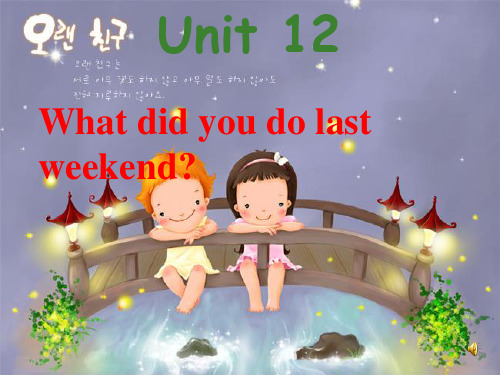
do some reading
clean my room
visit my parents
What do you do on weekend?
watch TV
What did you do last weekend?
(上个周末)
/t/
watched TV
/d/
play soccer
played soccer
She went to the library.
They had a party.
What did they do last weekend ?
They had a big dinner. have---had
What did you/he/she/they do last weekend? Saturday Sunday
with my friends. Then I watch TV
with my mother. In Sunday
morning, I played computer games. In the evening, I do my homework. What a happy day!
Write your last weekend.
Section A 2a-3c
What did I do last (上个)weekend?
went camping
played volleyball
What did he do last weekend?
study for a test /test/ study---- studied He studied for a test.
What did she do last weekend?
人教版新目标七年级下学期Unit-12--what-did-you-do-last-weekend--知识点

Unit 12 what did you do last weekend?Section A 知识讲解一. last(1)last形容词“最后的,最末的”或者“紧接前面的,刚过去的”。
Today is the last day in the year.最后一天。
I didn’t sleep well last night. 昨晚(2)last副词,“最后地”,I’m the last one.最后一个。
(3)last 动词,“持续,继续,维持”等,The hot weather lasted a week.持续了一周。
二. camp(1)camp 动词,“扎营,搭帐篷”。
We go camping every summer.We walked all day and camped by a river at night.(2)camp 名词,“露营地,度假营”。
Let’s go back to the camp, it’s getting dark. 让我们回营地吧,天黑下来了。
根据汉语提示填空。
(1)When did you join the ______ ______ (夏令营)?(2)I like ______ ______ (去宿营)in the open air.3)We______(宿营)in the forest last night. (4)Let’s go back to the ______(营地)三. sheepsheep 可数名词,“绵羊”,复数还是sheep;goat指山羊。
How many sheep are there on your farm? 你们农场里有多少只羊?拓展:常见的单复数同形的名词还有:deer (鹿),fish (鱼),Chinese (中国人),Japanese(日本人)等。
四. byby介词, “在……旁边”,相当于beside。
Our teacher is sitting by the window.by与交通工具名词连用时,名词前不用冠词,意为“乘、坐、用”等。
Unit 12 What did you do last weekend(Section A (Grammar Focus-3c))教学案(人教新目标七年级下册)
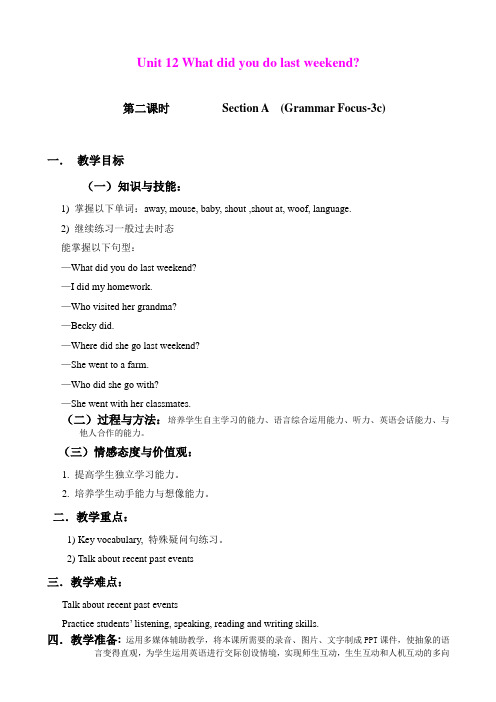
Unit 12 What did you do last weekend?第二课时Section A (Grammar Focus-3c)一.教学目标(一)知识与技能:1) 掌握以下单词:away, mouse, baby, shout ,shout at, woof, language.2) 继续练习一般过去时态能掌握以下句型:—What did you do last weekend?—I did my homework.—Who visited her grandma?—Becky did.—Where did she go last weekend?—She went to a farm.—Who did she go with?—She went with her classmates.(二)过程与方法:培养学生自主学习的能力、语言综合运用能力、听力、英语会话能力、与他人合作的能力。
(三)情感态度与价值观:1. 提高学生独立学习能力。
2. 培养学生动手能力与想像能力。
二.教学重点:1) Key vocabulary, 特殊疑问句练习。
2) Talk about recent past events三.教学难点:Talk about recent past eventsPractice students’ listening, speaking, reading and writing skills.四.教学准备:运用多媒体辅助教学,将本课所需要的录音、图片、文字制成PPT课件,使抽象的语言变得直观,为学生运用英语进行交际创设情境,实现师生互动,生生互动和人机互动的多向交流。
五.教学过程(一).温故互查温故互查学生自学新单词(教材P69的单词),看谁记得又快又准。
(2 分钟)根据首字母或汉语提示完成句子。
1. Do you understand body l ?2. The lovely b is only half a year old.3. There are many m (老鼠) near the old house.4. I (跑开) from home when I was sixteen years old.5. You needn't (大声叫嚷) me.(二).设问导读Ⅰ. Warming- up and revision1. Greet students.2. Check the homeworkⅡ. Grammar Focus.1. 学生阅读Grammar Focus中的句子并完成下列填空题。
人教版英语七下U12 What did you do last weekend 讲义(学生版)

Unit12 What did you do last weekend?一、重点词汇及拓展1. campv. __________________ 去野营n. __________________ 去野营2. asprep. ______e.g. ________________________ 我在这儿作导游。
prep. ______e.g. ________________________ 他和我跑得一样快。
____________ 和...一样____________ 众所周知3. natural adj. ______e.g. ____________________________________自然博物馆里有许多蝴蝶。
______ n. 自然____________ 在大自然中____________ 享受大自然4. tired adj.__________________劳累;疲倦5. stayv.__________________待在家v.__________________保持健康____________熬夜____________远离...6. run away ______put away ______take away ______throw away ______give away ______go away ______7. mouse n.______复数:______8. shout v.____________呼喊...______朝...喊叫(带有情绪)9. language n.____________身体语言____________语言的美____________第二语言10. flyv.______e.g. ____________________________________他们在湖边放风筝。
____________飞去某地n.______e.g. __________________ 我讨厌苍蝇。
Unit 12 What did you do last weekend(讲义及答案)
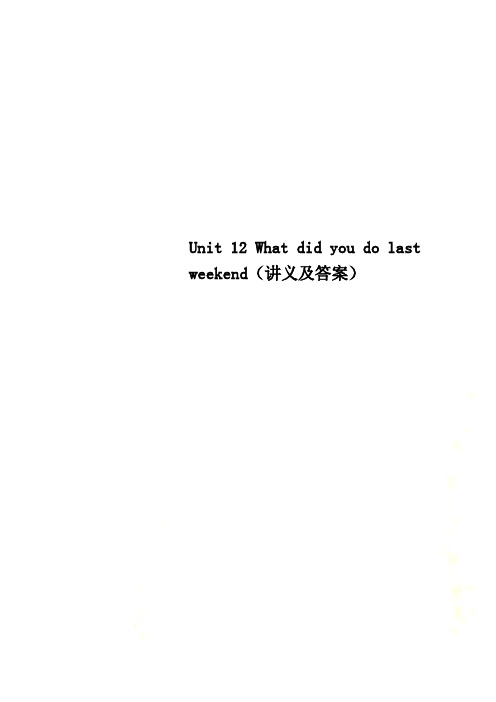
Unit 12 What did you do last weekend(讲义及答案)Unit 12 What did you do last weekend?(讲义)Part 1 Words and Expressionscamp /kæmp/ v. 扎营;搭帐篷lake /leɪk/ n. 湖;湖泊beach /biːtʃ/ n. 海滩;沙滩badminton /'bædmɪntən/n. 羽毛球运动sheep /ʃiːp/ n. 羊;绵羊as /æz/ prep. & adv. 作为;当作natural /'nætʃərəl/adj. 自然的butterfly /'bʌtə(r)flaɪ/ n. 蝴蝶visitor /'vɪzɪtə(r)/n. 游客;访问者tired /taɪə(r)d/adj. 疲倦的;疲劳的stay /steɪ/ v. 停留;待stay up late 深夜不睡;熬夜away /ə'weɪ/ adv. 离开;远离run away 跑开mouse /maʊs/ n. (pl. mice /maɪs/) 老鼠;耗子baby /'beɪbi/ adj. 幼小的n. 婴儿shout /ʃaʊt/ v. 呼叫;喊叫shout at …冲……大声叫嚷woof /wʊf/ interj. (狗叫声)汪汪language /'læŋgwɪdʒ/ n. 语言fly /flaɪ/ v. (flew /fluː/)飞kite /kaɪt/ n. 风筝fly a kite 放风筝high /haɪ/ adj. & adv. 高的(地)high school 中学ago /ə'gəʊ/ adv. 以前India /'ɪndiə/n. 印度tent /tent/ n. 帐篷put up 搭起;举起moon /muːn/ n. 月亮surprise /sə(r)'praɪz/ n. 惊奇;惊讶v. 使吃惊get a surprise 吃惊snake /sneɪk/ n. 蛇开始做某事surprise n. 惊奇;惊讶v. 使吃惊You didn’t know my surprise when I he ard that news.My sister and I got a terrible surprise yesterday.get a surprise 吃惊Jimmy’s words surprised me a lot.It surprised us to see Jane get up soearly. surprise sb. 使……吃惊n. 意想不到的事;惊喜It’s a lovely surprise to see youagain. I have a little surprise foryou.shout v. 呼叫;喊叫There’s no need to shout. I am notdeaf! We could hear them shoutingfor help. shout at…s hout to…The bus driver is shouting at the oldman. Don’t shout at me. I don’t likethat.I had to shout to Tom because he was so far from me.My mother shouted to me on the other side of the road, but I still couldn’t hear her w ords.shout at…对……叫嚷,多指因shout to…对……喊,多指因Part 2 Role-playRole-play the conversation.Paul: Hi, Lisa. How was yourweekend? Lisa: Great, thanks.Paul: What did you do?Lisa: I worked as a guide at the Natural HistoryMuseum. Paul: Really? How interesting!Lisa: Yeah, it was fun. They have butterfly house with over 200 kinds of butterflies! I told the visitors about themand their living habits. Did you have a good weekend? Paul: Yeah, it was good, but I’m kind of tired now. I stayed up late to watch the soccer game.How interesting!Look at the bird. How beautiful!I had a terrible weekend. How tired!Five hours ago we left Beijing on this train, but now we’re arriving in Shanghai! How fast!I got on the bus one hour ago. How slowly!how 引导感叹句,译为“多么……;真……”,后面接或。
Unit-12-What-did-you-do-last-weekend-教案
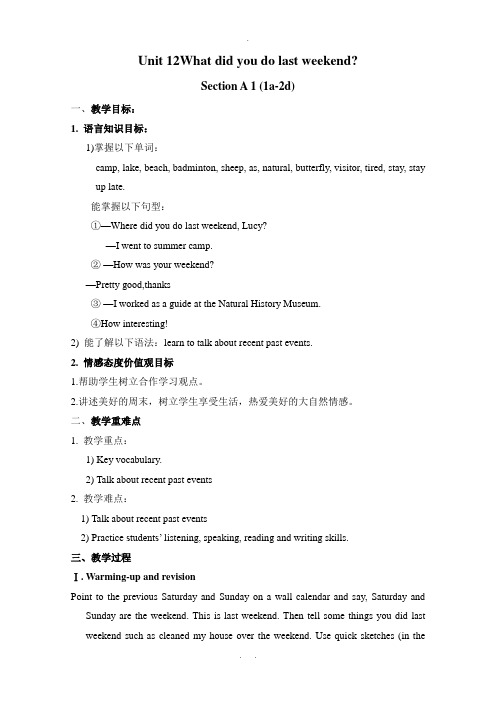
Unit 12What did you do last weekend?Section A 1 (1a-2d)一、教学目标:1. 语言知识目标:1)掌握以下单词:camp, lake, beach, badminton, sheep, as, natural, butterfly, visitor, tired, stay, stay up late.能掌握以下句型:①—Where did you do last weekend, Lucy?—I went to summer camp.②—How was your weekend?—Pretty good,thanks③—I worked as a guide at the Natural History Museum.④How interesting!2) 能了解以下语法:learn to talk about recent past events.2. 情感态度价值观目标1.帮助学生树立合作学习观点。
2.讲述美好的周末,树立学生享受生活,热爱美好的大自然情感。
二、教学重难点1. 教学重点:1) Key vocabulary.2) Talk about recent past events2. 教学难点:1) Talk about recent past events2) Practice students’ listening, speaking, reading and writing skills.三、教学过程Ⅰ. Warming-up and revisionPoint to the previous Saturday and Sunday on a wall calendar and say, Saturday and Sunday are the weekend. This is last weekend. Then tell some things you did last weekend such as cleaned my house over the weekend. Use quick sketches (in theboard along with gestures to demonstrate the meaning of each activity,Ⅱ.1 a This activity introduces the key vocabulary.Focus attention on the picture. Ask students to tell what they see. Name each activity and ask students to repeat:did my homework, went to the cinema, went boating, camped by the lake, went to the beach,played badminton.Point out the numbered list of activities. Say each one again and ask students to repeat.Then ask students to match each activity with one of the pictures. Say, Write the letter of each activity next to the words. Point out the sample answer.Check the answers.Ⅲ. ListeningWork on 1bThis activity gives students practice in understanding the target language in spoken conversation.Point to the activities in the picture in activity la. Ask students to tell what the person did in each picture. For example, she played badminton, or Lucy went to the cinema. Play the recording the first time. Students only listen.Play the recording a second time. This time say. Listen to the recording and write the days and times Lucy did each thing under the pictures. Point out the sample answer under the picture of Lucy playing badminton; on Saturday morning.Correct the answers.Ⅳ. PairworkWork on 1cThis activity provides guided oral practice using the target language.Point to the example conversation. Ask two students to read the dialogue to the class.Say, now work with a partner. Student A, pretend to be Lucy. Student B, ask questions about what Lucy did on different days and times over the weekend.Talk about the activities in the picture.Students work in pairs. As they talk, move around the room monitoring their work.Offer language or pronunciation support as needed,Ⅴ. ListeningWork on 2a:This activity gives students practice in understanding the key vocabulary in spoken conversation.Point to the five sentences and ask a student to read these sentences to the class.Say, You will hear recording of a conversation. The people will talk about some of the activities and people, but they will not talk about others. Please underline the words you hear on the recording.Play the recording the first time. Students only listen.Play the recording a second time. This time, ask students to underline each word that is said on the tape. Point out the sample answer, grandmother.Correct the answers.1grandma 2 homework 3 English 4 farm 5 cowsⅥ. ListeningWork on 2b:This activity provides listening practice using the target language.Call attention to the pictures of Carol, Becky, and Jack and ask students to identify each person by name.Say, Now I will play the recording again. Listen to the students talking about what they did over the weekend. Write C for Carol, B for B Becky or J for Jack next to each statement in activity 2a. The first one has been done for you.Play the recording the first time. Students only listen.Point out the sample answer, S, in statement 1. Say, Sonia visited her grandmother.Play the recording again. Ask students to write a letter in front of each statement to show what each person did.Check the answers. B B C J JⅦ. Pair workAsk and answer in pairs.Point to the example conversation. Ask two students to read the dialogue to the class.Say, Now work with a partner. Student A, ask questions about what,who or where, Student B answers. Students work in pairs.Ⅷ.Role-play the conversation.1. Ask Ss to look at conversation in 2d. Then Ss read the dialogue by themselves andfind the answer to these questions:① What did Lisa do on her weekend?② What did Paul do on his weekend?2. Ss work in pairs and role-play the conversations.3. Have several pairs perform their conversations for the rest of the class.Homework:1. Copy new words twice.2. Write about what you did last weekend.板书设计:Section A 2 (Grammar Focus-3c)一、教学目标:1. 语言知识目标:1) 掌握以下单词:away, mouse, baby, shout ,shout at, woof, language.2) 继续练习一般过去时态能掌握以下句型:—What did you do last weekend?—I did my homework.—Who visited her grandma?—Becky did.—Where did she go last weekend?—She went to a farm.—Who did she go with?—She went with her classmates.2. 情感态度价值观目标:1.提高学生独立学习能力。
unit_12_What_did_you_do_last_weekend?词句精讲精练
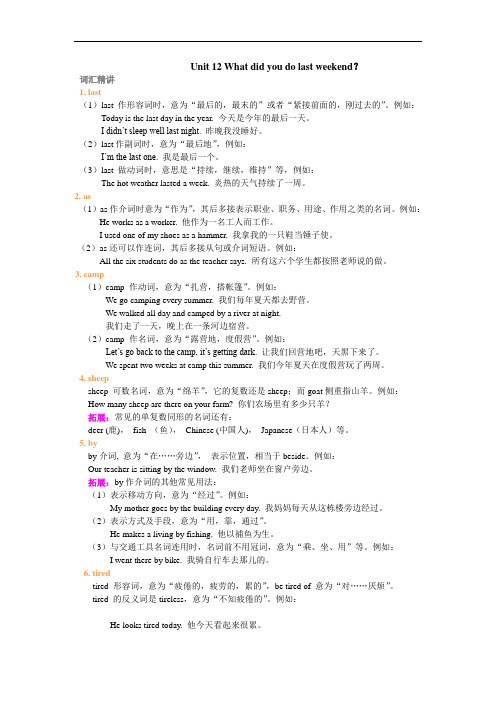
Unit 12 What did you do last weekend?词汇精讲1. last(1)last 作形容词时,意为“最后的,最末的”或者“紧接前面的,刚过去的”。
例如:Today is the last day in the year. 今天是今年的最后一天。
I didn’t sleep well last night. 昨晚我没睡好。
(2)last作副词时,意为“最后地”,例如:I’m the last one. 我是最后一个。
(3)last 做动词时,意思是“持续,继续,维持”等,例如:The hot weather lasted a week. 炎热的天气持续了一周。
2. as(1)as作介词时意为“作为”,其后多接表示职业、职务、用途、作用之类的名词。
例如:He works as a worker. 他作为一名工人而工作。
I used one of my shoes as a hammer. 我拿我的一只鞋当锤子使。
(2)as还可以作连词,其后多接从句或介词短语。
例如:All the six students do as the teacher says. 所有这六个学生都按照老师说的做。
3. camp(1)camp 作动词,意为“扎营,搭帐篷”。
例如:We go camping every summer. 我们每年夏天都去野营。
We walked all day and camped by a river at night.我们走了一天,晚上在一条河边宿营。
(2)camp 作名词,意为“露营地,度假营”。
例如:Let’s go back to the camp, it’s getting dark. 让我们回营地吧,天黑下来了。
We spent two weeks at camp this summer. 我们今年夏天在度假营玩了两周。
4. sheepsheep 可数名词,意为“绵羊”,它的复数还是sheep;而goat侧重指山羊。
最全面人教版七年级下册英语第十二单元知识点归纳总结
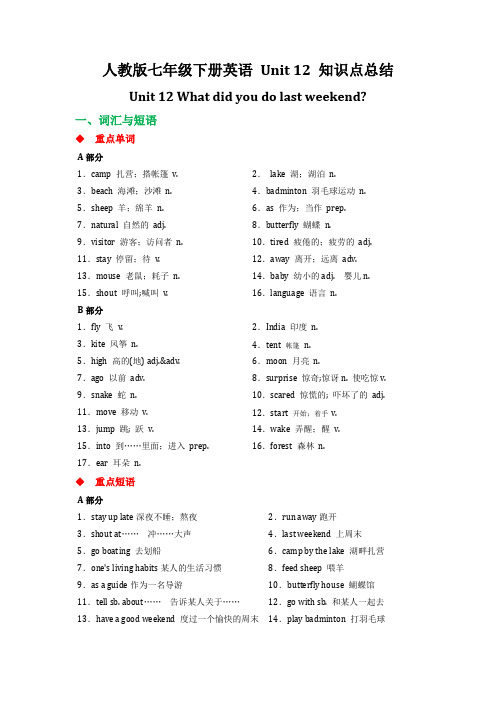
人教版七年级下册英语Unit 12 知识点总结Unit 12 What did you do last weekend? 一、词汇与短语◆重点单词A部分1.camp 扎营;搭帐篷v.2.lake 湖;湖泊n.3.beach 海滩;沙滩n.4.badminton 羽毛球运动n. 5.sheep 羊;绵羊n.6.as 作为;当作prep. 7.natural 自然的adj.8.butterfly 蝴蝶n.9.visitor 游客;访问者n.10.tired 疲倦的;疲劳的adj. 11.stay 停留;待v.12.away 离开;远离adv. 13.mouse 老鼠;耗子n.14.baby 幼小的adj. 婴儿n. 15.shout 呼叫;喊叫v.16.language 语言n.B部分1.fly 飞v.2.India 印度n.3.kite 风筝n.4.tent 帐篷n.5.high 高的(地) adj.&adv.6.moon 月亮n.7.ago 以前adv.8.surprise 惊奇;惊讶n. 使吃惊v. 9.snake 蛇n.10.scared 惊慌的; 吓坏了的adj. 11.move 移动v.12.start 开始;着手v.13.jump 跳; 跃v.14.wake 弄醒;醒v.15.into 到……里面;进入prep.16.forest 森林n.17.ear 耳朵n.◆重点短语A部分1.stay up late深夜不睡;熬夜2.run away跑开3.shout at……冲……大声4.last weekend 上周末5.go boating 去划船6.camp by the lake 湖畔扎营7.one's living habits某人的生活习惯8.feed sheep 喂羊9.as a guide作为一名导游10.butterfly house 蝴蝶馆11.tell sb. about……告诉某人关于……12.go with sb. 和某人一起去13.have a good weekend 度过一个愉快的周末14.play badminton 打羽毛球B部分1.fly a kite 放风筝2.high school 中学3.put up 搭起;举起4.each other 互相;彼此5.get a surprise 吃惊6.shout to……对……大声喊叫7.up and down 上上下下;起伏8.wake……up 把……弄醒9.a special gift 一件特殊的礼物10.take a long bus ride to 乘长途车去11.put up 搭起;举起12.keep sb. warm 使某人暖和13.on the first night 在第一个夜晚14.tell a story 讲故事15.go to sleep 入睡,睡着16.look out of 朝外看17.read a book about…读关于…的书18.know about 知道关于19.start to do sth. 开始做某事20.jump up and down 跳上跳下21.move into 搬进22.make a fire 生火23.something interesting 有趣的事情24.feel……doing sth. 觉得……正在做某事25.finish high school 高中毕业26.see……doing sth. 看见……正在做某事27.clean one's room 打扫房间28.so……that……如此……以至于……29.on Saturday night 在周六晚上30.have dinner with sb.和某人一起吃晚饭31.stay at home 待在家里32.have a busy weekend度过一个繁忙的周末33.talk show 脱口秀34.study for……为……学习◆重点句子A部分1.—What did you do last weekend? 上个周末你做什么了?—I did my homework. 我做我的家庭作业了。
Unit 12 What did you do last weekend-知识点整理

Unit 12 What did you do last weekend?知识点整理Unit 12 What did you do last weekend?知识点整理一、重点短语1. play badminton 打羽毛球2. camp by the lake 在湖边野3. gbeach 去海滩4. ga 去电影院5. tell sb. about sth.告诉某人有关...的情况6. stay up 熬夜7. ovan超过;多余 8. fly a kite 放风筝9. run away 逃跑 10. second language 外语11. anythingg注:不定代词+形容词 12. shout to sb. 对某人大声喊叫13. that’s why+从句“那就是为什么......” 14. ta 带领某人去某处15. put u搭建帐篷 16. make a fire 生火us warm 使得我们暖和ght 在头一天夜里19. und在月光下 20. ea互相21. get a terrible surprise 大吃一惊 22. look out of 从......往外看23. know about 知道 24. start to do sth. 开始做某事25. up and down 上上下下 26. wake up 醒来 wake sb. up 叫醒某人27. mov移动进入 28. learned from 从......学到29. stay at home 呆在家里二.重点句型1. —What did you do last week? 你上个星期做了什么事?—I didwork. /We went boating 我做我的作业。
/我们去划船了。
2. —How was your weekend? 你上个星期过得怎样?—Great,thanks. 很好,谢谢。
3. I stayed up late to wagame. 我熬夜到很晚是为了看球赛。
2019人教版七下Unit12 What did you do last weekend 重点知识归纳
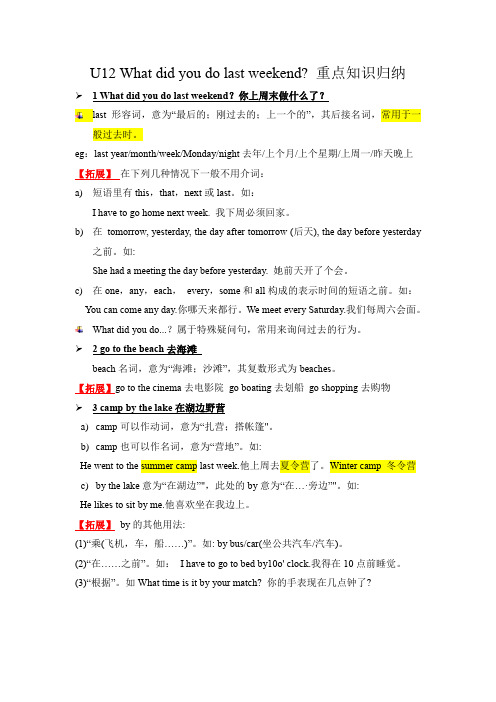
U12 What did you do last weekend? 重点知识归纳1 What did you do last weekend?你上周末做什么了?last形容词,意为“最后的;刚过去的;上一个的”,其后接名词,常用于一般过去时。
eg:last year/month/week/Monday/night去年/上个月/上个星期/上周一/昨天晚上【拓展】在下列几种情况下一般不用介词:a)短语里有this,that,next或last。
如:I have to go home next week. 我下周必须回家。
b)在tomorrow, yesterday, the day after tomorrow (后天), the day before yesterday之前。
如:She had a meeting the day before yesterday. 她前天开了个会。
c)在one,any,each,every,some和all构成的表示时间的短语之前。
如:You can come any day.你哪天来都行。
We meet every Saturday.我们每周六会面。
What did you do...?属于特殊疑问句,常用来询问过去的行为。
2 go to the beach去海滩beach名词,意为“海滩;沙滩”,其复数形式为beaches。
【拓展】go to the cinema去电影院go boating去划船go shopping去购物3 camp by the lake在湖边野营a)camp可以作动词,意为“扎营;搭帐篷"。
b)camp也可以作名词,意为“营地”。
如:He went to the summer camp last week.他上周去夏令营了。
Winter camp 冬令营c)by the lake意为“在湖边”",此处的by意为“在…·旁边”"。
Unit12__What_did_you_do_last_weekend知识点、一般过去时解析_单元测试及答案[1]
![Unit12__What_did_you_do_last_weekend知识点、一般过去时解析_单元测试及答案[1]](https://img.taocdn.com/s3/m/6084ea243169a4517723a3ee.png)
Unit12 What did you do last weekend?I词性转换1.beach 复数:beaches2.sheep 复数:sheep3.nature 形容词:natural4.butterfly 复数:butterflies5.visit 名词:visitor6.mouse 复数:mice7.baby 复数:babies8.fly过去式:flew9.sing 过去式:sang 10.swim 过去式:swam 11.surprise 形容词:surprised,surprising 12.wake 过去式:woke 13.put 过去式:put 14.tell 过去式:told 15.leave 过去式:leftII短语归纳1.do my homework 做作业2.go to the cinema 去看电影3.go boating 去划船4.by the lake 在湖边5.go to the beach 去海滩6.play badminton 打羽毛球7.visit my grandma 看望我奶奶8.study for the English test 为英语测验而学习备考9.the Natural History Museum 自然历史博物馆10.kind of 有点儿11.stay up 深夜不睡,熬夜12.give back 归还13.be afraid 害怕14.play the guitar 弹吉他15.go to the library 去图书馆16.in a swimming pool 在游泳池里17. s hout at… 冲……大声叫嚷18.high school 高中,中学19.fly kites 放风筝、20.go camping 去野营21.put up 搭建22.make a fire 生火23.tell stories 讲故事24.each other 互相25.go to sleep 入睡26.get a surprise 吃惊27.shout to… 呼喊……喊叫……28.up and down 来来回回;上上下下29.wake…up 把……弄醒31.on Saturday morning 在星期六早上32.have a good weekend 周末过得愉快33.the next morning 第二天早上34.work as 以……身份而工作35.run away 跑开36.move into … 移进…不规则动词过去式:am,is--was, are--were, do--did, see--saw, say-said, give-gave,get-got, go-went, come-came, have-had, eat-ate, take-took,run-ran, sing-sang, put-put, fly-flew,make-made, read-read,write-wrote, draw-drew, drink-drank, ride-rode, speak-spoke,sweep-swept, swim-swam, sit-sat单元测试题一.根据首字母或汉语提示完成句子:1.---Does he often go to Beijing by plane? ---- Yes, he often f___________ to Beijing. Hef_________ to Beijing yesterday.2.The girl c__________ back from Shanghai yesterday, and now he is very t_______________.3.There are many wild a___________________ in the f_________________.4.These v__________ v_______ our school yesterday. They said our school was very good.5.The young woman h______ two twin b______ last week.6.That old man feeds many_________(小鸡) and __________(绵羊) at home.7. ---Did your family go to the _____ (海滩) last Sunday ? --- No, we __________(去了)the park.8. My mother visited the _____ (自然的) History Museum and a ____________(语言) school last month .9. They are on __________(假期) in _________(加拿大).10. He _________ up late(熬夜) last night, don’t ________ him up (弄醒).二,单项选择:( ) 1 –Do you like playing ____badminton? ---No, I like playing _____ guitar.A the;/B the; theC a ; aD / ; the( ) 2 Jim usually gets up at 6:30 ____ the morning on weekdays, but ___ Saturday morning he gets up at 9:00. A in ; on B in ; in C on ; in D on ; on( ) 3 --_____you busy last weekend? --Yes, I helped my mother clean the house and the garden.A WereB WasC DidD Are( ) 4 – What did they do last weekend? -- They _______in the park.A went a boatB went to a boatC went boatingD took boating( ) 5 How many ____did you see on the farm?A sheepsB sheepC cowD chicken( ) 6 –Did you have a good weekend?---Yes ,it was good. But I was kind of ______.A interestedB happyC tiredD excited( ) 7 Mary _____very late last night .A stayed upB sat downC woke upD put down( ) 8 Mike _____ in the swimming pool yesterday.A swimedB swimmedC swamD swims( ) 9 There isn’t ________ in the restaurant .A something deliciousB anything deliciousC everything expensiveD nothing expensive ( ) 10 The movie was ______ but ______.A interested ; scaredB interested ; scaryC interesting ; scaredD interesting ; scary ( ) 11 Did you see the boy _____ soccer on the playground just now ?A playedB playsC playingD to play( ) 12 My uncle went to Nanjing____.A a week beforeB a week agoC before a weekD ago a week( ) 13 They _____ a tent and made a fire to keep them warm .A put upB put onC put downD put off( ) 14 _______ the second night , it rained hard . A In B At C For D On ( ) 15 Don’t ______. He is too tired .A wake him upB wake her upC wake up himD wake up her( ) 16 Last weekend I didn’t ______ my aunt .A visitedB sawC visitD look( ) 17 Jenny often ____ to school early , but this morning she ______ to school late .A go ; wentB went ; goesC goes ; wentD goes ; goes( ) 18 My father _____ to America last week .A flewB flyedC fliedD flies( ) 19 Do you have ______ to say ?A something importantB important somethingC important anythingD anything important ( ) 20 --______? --- She played the piano .A What does Betty doB What did Betty doC What is Betty doingD Where was Betty ( ) 21—Who cleaned the room ?--- Li Lei ________.A wasB didC isD had( ) 22Li Lei _____ the book ____ the library last week .A gave ; backB gives ; backC gave ; back toD gives ; back to( ) 23 The mouse ______ when I came in .A ran awayB in runningC run awayD runs away( ) 24 Tony was very angry with his sister , so he _____ her .A shoutedB shouted toC shouted withD shouted at( ) 25 How many languages can Sally ______ ?A talkB sayC speakD tell( ) 26 Tom played _____ badminton with his friends yesterday afternoon.A aB theC atD /( ) 27 I often do my homework and read books _____ Saturday morning.A onB inC atD by( ) 28 How do you study ______ your test ?A atB withC inD for( ) 29 Could you tell me something about your ____ ?A live habitB living habitsC life habitD life habits( ) 30 Linda ______ very late to learn Chinese last year .A isB wasC doesD did三,句型变换:1. His mother did the shopping. (对划线部分提问) ___________ the shopping?2. They played football(对划线部分提问) _________ _________ they do ?3. The boy went to the park.(对划线部分提问) __________ the boy ___________?4. She felt well. (对划线部分提问) _____________did she __________ ?5. He put it here. (否定句) He ________ ________ it here.四. 用括号内单词的正确形式填空:1 ---Did he go ______ (camp) last summer vocation ? --- Yes, he _________(do) that every year.2 There were so many ______ (mouse) and _________(butterfly) in that old room.3 Tina ______ (sing) two Chinese __________(sing) at the party last night.4 Li Lei _______ (leave) school two years ago and now he ________(be) a teacher.5 I ___________ ( start) _________(learn) English five years ago .6. Snakes _____________(not have) ears but they can feel things _____________(move).7. I got out of the room and ___________(see) the boys ______________(play).8. Last weekend_________(be) a good one, my parents _________(take) me to the park.9. It is important for us _____________(do) that well.10. That is a very ______________(use) lesson.五补全对话。
Unit 12 What did you do last weekend导学案

Unit 12 What did you do last weekend导学案本资料为woRD文档,请点击下载地址下载全文下载地址Unit12whatdidyoudolastweekend?SectionA1a—1c*教师寄语:Ifyouwanttounderstandtoday,youhavetosearchyesterday.想要懂得今天,就必须研究昨天。
【学习目标】【学习重点】:进一步学习过去时态的用法;学会谈论过去事件。
--whatdidyoudolastweekend?--well,onSaturdaymorning, Iplayedbadminton.【体验学习】:I、预习交流.根据单元标题和图片等,预测新课内容;2.根据音标拼读单词并牢记;3.自学课文,勾画出重点和疑惑。
II、翻译官.做作业__________________2.去海滩______________________4.goboating________________5.打羽毛球____________________3.去电影院________________6.campbythelake_______________【课堂导学】:I、新课呈现Step1Review&Lead-inAskseveralstudentsonebyone:whatdidyoudolastweekend?Step2Presentation.Learnthephrasesin1a.2.Finish1a,thenchecktheanswers.3.Lookattheconversation,andlearnthedrills:--whatdidyoudolastweekend?--well,onSaturdaymorning, Iplayedbadminton.Step3ListeningListenandfinish1b.checktheanswers.Step4PairworkPracticetheconversationin1c.Thenmakeyourownconversa tions.II、合作交流Groupwork:尝试用一般过去时造句+表过去的时间状语。
Unit-12-What-did-you-do-last-weekend-大赛课教案
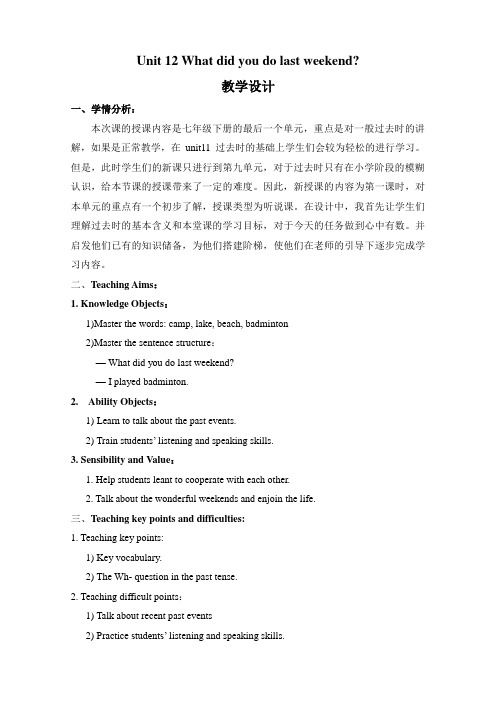
Unit 12 What did you do last weekend?教学设计一、学情分析:本次课的授课内容是七年级下册的最后一个单元,重点是对一般过去时的讲解,如果是正常教学,在unit11过去时的基础上学生们会较为轻松的进行学习。
但是,此时学生们的新课只进行到第九单元,对于过去时只有在小学阶段的模糊认识,给本节课的授课带来了一定的难度。
因此,新授课的内容为第一课时,对本单元的重点有一个初步了解,授课类型为听说课。
在设计中,我首先让学生们理解过去时的基本含义和本堂课的学习目标,对于今天的任务做到心中有数。
并启发他们已有的知识储备,为他们搭建阶梯,使他们在老师的引导下逐步完成学习内容。
二、Teaching Aims:1. Knowledge Objects:1)Master the words: camp, lake, beach, badminton2)Master the sentence structure:— What did you do last weekend?— I played badminton.2. Ability Objects:1) Learn to talk about the past events.2) Train students’ listening and speaking skills.3. Sensibility and Value:1. Help students leant to cooperate with each other.2. Talk about the wonderful weekends and enjoin the life.三、Teaching key points and difficulties:1. Teaching key points:1) Key vocabulary.2) The Wh- question in the past tense.2. Teaching difficult points:1) Talk about recent past events2) Practice students’ listening and speaking skills.四、Teaching ProceduresⅠ. Warming-up1.Show six sentences on the screen with three sentences in simple present tense andthree sentences in simple past tense. Ask students to read them and find the differences between these sentences. Then show the topic.2.Check students if they can change some base form of simple verb into the pastform to lay a foundation for today’s lesson.3.Show studying aims to students and let them know what we will learn today.Ⅱ. Presentation1.Give the students some pictures and learn some new words.1)Show two pictures on the screen. One is about “do one’s homework”and theother is about “play badminton”.2)First, the teacher asks “What do they usually do on weekends?” Students answerthe question as “They do their homework”with the help of the picture. Then change the time. “What did they do last weekend?” Ask students change do to did. And use the full sentence to answer the question.2.Teach other new words and phrases in the same way: want boating; went to thecinema; went to the beach.3.After teaching the words, let students try their best to answer the questions incomplete sentences.4.Revise the key verb phrases. Students can speak out the phrases by seeing theChinese meaning.III. Practice.Task one:Guessing game1. Show the picture that is covered on the screen and let students guess what theperson did last weekend.2. Students can get the clue step by step. If they get the correct answer, they can gettwo points for their group.3. After guessing, read the question and the answer toghter.Task two: Ask and answer1.Show the pictures that we have learned on the screen and ask students thequestion ”What did you do last weekend?” Students should answer the question with these pictures.2.Then let students work in pairs to make a short conversation.--- What did you do last weekend?--- I did my homework on Sunday night.3. A chain-game without repeating.A: What did you do last weekend, B?B: I did my homework. What did you do last weekend, C?C: I … What did you do…, D?D:…IV. Listening and Speaking1. Play the recording the first time. Students listen and underline the words theyhear.2. Play the recording a second time. This time say. Listen to the recording and fill inthe blanks..3. Check the answers. Read the short passage.4. Try to recite the passage with limited words. Try twice with fewer and fewer words.5. According to the example, i t’s students’ turn to tell what they did last weekend. V. HomeworkWrite a short passage about your last weekend?VI. Blackboard Design:。
- 1、下载文档前请自行甄别文档内容的完整性,平台不提供额外的编辑、内容补充、找答案等附加服务。
- 2、"仅部分预览"的文档,不可在线预览部分如存在完整性等问题,可反馈申请退款(可完整预览的文档不适用该条件!)。
- 3、如文档侵犯您的权益,请联系客服反馈,我们会尽快为您处理(人工客服工作时间:9:00-18:30)。
Unit 12 What did you do last weekend?
教学设计
一、学情分析:
本次课的授课内容是七年级下册的最后一个单元,重点是对一般过去时的讲解,如果是正常教学,在unit11过去时的基础上学生们会较为轻松的进行学习。
但是,此时学生们的新课只进行到第九单元,对于过去时只有在小学阶段的模糊认识,给本节课的授课带来了一定的难度。
因此,新授课的内容为第一课时,对本单元的重点有一个初步了解,授课类型为听说课。
在设计中,我首先让学生们理解过去时的基本含义和本堂课的学习目标,对于今天的任务做到心中有数。
并启发他们已有的知识储备,为他们搭建阶梯,使他们在老师的引导下逐步完成学习内容。
二、Teaching Aims:
1. Knowledge Objects:
1)Master the words: camp, lake, beach, badminton
2)Master the sentence structure:
— What did you do last weekend?
— I played badminton.
2. Ability Objects:
1) Learn to talk about the past events.
2) Train students’ listening and speaking skills.
3. Sensibility and Value:
1. Help students leant to cooperate with each other.
2. Talk about the wonderful weekends and enjoin the life.
三、Teaching key points and difficulties:
1. Teaching key points:
1) Key vocabulary.
2) The Wh- question in the past tense.
2. Teaching difficult points:
1) Talk about recent past events
2) Practice students’ listening and speaking skills.
四、Teaching Procedures
Ⅰ. Warming-up
1.Show six sentences on the screen with three sentences in simple present tense and
three sentences in simple past tense. Ask students to read them and find the differences between these sentences. Then show the topic.
2.Check students if they can change some base form of simple verb into the past
form to lay a foundation for today’s lesson.
3.Show studying aims to students and let them know what we will learn today.
Ⅱ. Presentation
1.Give the students some pictures and learn some new words.
1)Show two pictures on the screen. One is about “do one’s homework”and the
other is about “play badminton”.
2)First, the teacher asks “What do they usually do on weekends?” Students answer
the question as “They do their homework”with the help of the picture. Then change the time. “What did they do last weekend?” Ask students change do to did. And use the full sentence to answer the question.
2.Teach other new words and phrases in the same way: want boating; went to the
cinema; went to the beach.
3.After teaching the words, let students try their best to answer the questions in
complete sentences.
4.Revise the key verb phrases. Students can speak out the phrases by seeing the
Chinese meaning.
III. Practice.
Task one:Guessing game
1. Show the picture that is covered on the screen and let students guess what the
person did last weekend.
2. Students can get the clue step by step. If they get the correct answer, they can get
two points for their group.
3. After guessing, read the question and the answer toghter.
Task two: Ask and answer
1.Show the pictures that we have learned on the screen and ask students the
question ”What did you do last weekend?” Students should answer the question with these pictures.
2.Then let students work in pairs to make a short conversation.
--- What did you do last weekend?
--- I did my homework on Sunday night.
3. A chain-game without repeating.
A: What did you do last weekend, B?
B: I did my homework. What did you do last weekend, C?
C: I … What did you do…, D?
D:…
IV. Listening and Speaking
1. Play the recording the first time. Students listen and underline the words they
hear.
2. Play the recording a second time. This time say. Listen to the recording and fill in
the blanks..
3. Check the answers. Read the short passage.
4. Try to recite the passage with limited words. Try twice with fewer and fewer words.
5. According to the example, i t’s students’ turn to tell what they did last weekend. V. Homework
Write a short passage about your last weekend?
VI. Blackboard Design:。
